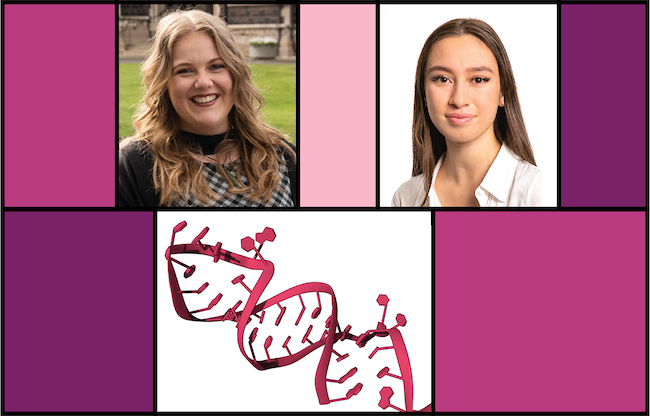
Congratulations to Kiri Burich and Amy Bennie - students of the Diermeier Lab who have recently won significant scholarships to support their studies into a relatively unknown class of molecules known as long non-coding RNAs (lncRNAs).
Kiri has won a University of Otago Māori Master's Research Scholarship, and Amy's PhD studies will be funded by a Neurological Foundation Doctoral Scholarship.
Dr Sarah Diermeier's research group investigates lncRNAs as therapeutic targets and biomarkers in cancer.
Kiri's path into cancer research was inspired by experiences with family members who have had cancer. “Many of my immediate family members have died from cancer, are fighting cancer, or are cancer survivors, and my mother has been the CEO of the Samoa Cancer Society for many, many years.”
“I was incredibly fortunate to be able carry out my summer research at Otago Biochemistry in Sarah's lab, and I enjoyed it so much that I chose to continue onto a master's degree.”
Kiri is studying a newly discovered lncRNA called lncTNBC1. Her plan is to investigate its involvement in the growth of triple negative breast cancer cells, an aggressive subtype of breast cancer.
Amy was already part way through her honours research on breast cancer toxicology when she heard about Sarah's research and was inspired to join Sarah's lab.
“I really loved her big picture approach to designing therapeutic agents, in particular her focus on patient benefit as a key outcome of her work, and I was very appreciative of the freedom she allowed me when designing a project.”
Amy will be focusing on lncRNA in a different type of cancer – glioblastoma. This is the most common central nervous system cancer found in adults. She aims to find out if it is possible to target lncRNAs to treat glioblastoma using a 3D organoid model of the cancer.
For this model, cells are grown in a dish in the lab, but instead of growing the cells in the traditional flat layer of only one cell deep, the cells are grown in a 3D cluster that more closely resembles an actual cancer within a brain.
Amy's project has additional support from elsewhere in the Department of Biochemistry and the Department of Pathology. “We were lucky enough to get Professor Stephanie Hughes and Associate Professor Tania Slatter on board as co-supervisors, which means I have a broad expertise base across all elements of the project on which I can build this work.”
Photo: Amy Bennie (left) and Kiri Burich above a stylised image of RNA.